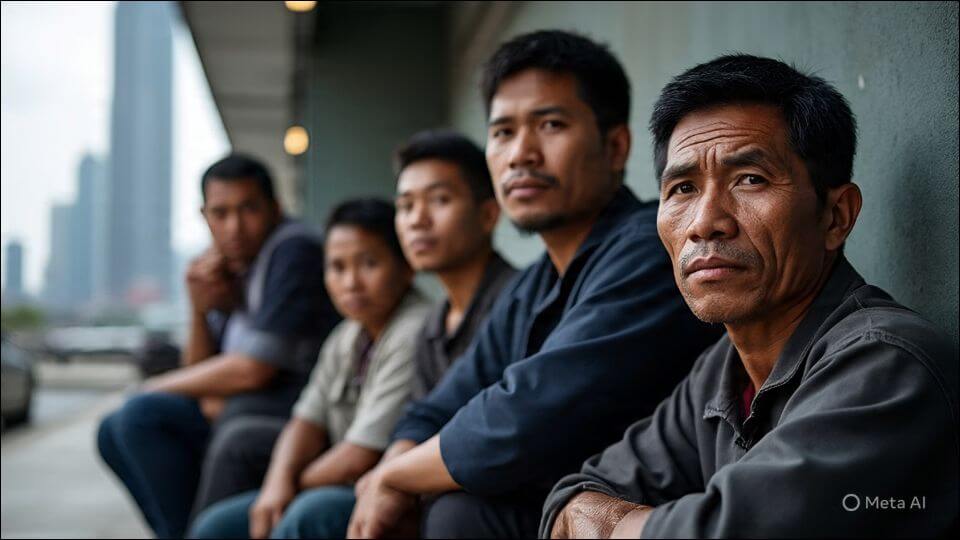I asked AI why the Philippines is poor.
Turns out, poverty has too many culprits: colonial extraction, policy inertia, elite capture, digital exclusion, and a national addiction to survival performances disguised as resilience. It’s a long list, and every answer felt familiar, tired, or tragically accurate.
You can read that full reckoning here: 👉 Why the Philippines Is Poor
But on a brighter note, let’s talk about money.
I. The Promise: Trillions in Potential
According to the National Economic and Development Authority (NEDA), the Philippines could gain ₱2.6 trillion annually if businesses adopt AI-powered solutions across sectors like retail, logistics, manufacturing, and finance.
The Department of Trade and Industry (DTI) adds that AI could contribute ₱5.3 trillion to GDP by 2030, or 12% of total economic output.
Visa, meanwhile, is rolling out AI-driven payment platforms like Visa Flex, Visa Pay, and Visa Accept, aiming to make digital transactions faster, smarter, and more inclusive.
So yes—AI is making money move. But for whom?
II. The Reality: Inclusion or Illusion?
GCash and Maya are using AI to expand financial access, especially for the unbanked. But digital wallets don’t fix structural poverty. And AI doesn’t erase the fact that:
- 54% of Filipino CEOs say their companies haven’t adopted AI yet
- Only 22% feel ready to handle AI’s impact on jobs and talent
- Only 47% believe they’re educating workers about AI’s risks and benefits
In short, the hype is real, but the readiness isn’t.
III. The Risk: Smart Tools, Dumb Systems
AI can optimize payments, detect fraud, and personalize banking. But it can also:
- Centralize power in tech monopolies
- Widen inequality if only big firms can afford adoption
- Spread misinformation through financial scams and deepfakes
- Displace workers without offering re-skilling
And if we don’t build AI with Filipino realities in mind—like 5-6 loans, sari-sari credit, and barangay-level trust systems—we risk designing tools that exclude the very people they claim to serve.
IV. The Opportunity: AI for Kita, Not Just Capital
AIWhyLive has long argued that AI must serve dignity, not just data. That means:
- Training AI on local financial behavior, not just global banking norms
- Building tools for micro-entrepreneurs, not just enterprise clients
- Using AI to expose corruption, not just optimize transactions
- Designing with agency, so Filipinos shape the tech, not just use it
We call this AI for Kita—a framework that centers livelihood, context, and community ownership.
🕹️ Breaking the Habit: From Mindless Scrolling to Time Investment
AI doesn’t just live in banks or apps—it lives in our habits. Every day, Filipinos spend hours on curated content, doomscrolling through lives they’re told to envy. But AI can be redirected. Imagine turning that screen time into profit time: prompt-based tutoring, captioning gigs, community research, fact-checking, translating, and archiving local stories.
Convert consumption into creation. Let AI be the partner, not the puppet-master.
🧍 No Excuses, No Blame Game—Help Yourself
No tech—AI or otherwise—will save us unless we use it with intent. Poverty won’t end with downloads or dashboards. Dignity won’t come from viral templates. So yes, the government must do better. Yes, platforms must localize.
But you also must move. Learn the tools. Share the hacks. Teach others. No one will save you but yourself, and in that truth lies power.
💬 Final Thought: Why Live Poor?
AI and money are already dancing in the Philippines. But if we let the rich choreograph the steps, the poor will never get on stage.
So let’s build tools that don’t just move money, but move people, shift power, and rewrite the story.
I’m done saying it sucks to be poor. Because poverty in the Philippines is not just hard— it’s exploited, romanticized, and recycled for photo ops and pity clicks.
There’s no blessedness in being poor when that poverty becomes a set design for politicians. No dignity in staying broke for someone else’s narrative of “resilience.”
It’s time to reject survival as performance. To stop waiting for saviors. To embrace AI not just as a tool, but as a weapon for self-respect, livelihood, and leverage.
And yes, to adopt the mindset of the rich:
- Long-term thinking
- Scalable systems
- Relentless value creation
- Ownership, not obedience
Let the poor be the architects—not the audience—of the AI economy. Because we don’t just deserve better tech. We deserve better returns on our lives.
📚 Numbered
- Philippines to gain ₱2.6T a year from AI solutions — NEDA
- DTI says AI can contribute $92 billion to PH economy — ABS-CBN
- AI seen to boost PH economy by ₱2.8 trillion by 2030 — Newsbytes
- The Economic Impact of Generative AI in the Philippines — Access Partnership
- AI in Philippine Banking: Embracing Innovation Amid Challenges — PIDS
- BPI taps AI, digital cash for economic growth — Daily Tribune
- The State of Artificial Intelligence in the Philippines — Yondu







